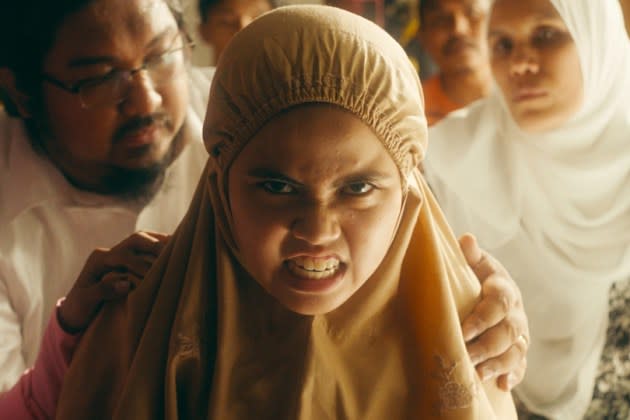Malaysian Filmmakers, Academics Slam Expanded Censorship Rules: ‘Filmmaking Is Now a Dangerous Vocation’

Filmmakers in Malaysia are predicting more arrests and criminal investigations if the government pushes through proposed guidelines to the country’s censorship system and expands the remit of the Film Censorship Board (LFP).
Malaysia has in recent years gained itself an intolerant reputation after numerous bans or restrictions on Hollywood and Asian films that have been widely released elsewhere. These have included Pixar’s “Buzz Lightyear” and Marvel’s “Thor: love and Thunder,” apparently due to their LGBT subplots or characters, and 2017 Indian blockbuster “Padmaavat” on religious grounds.
More from Variety
But the Freedom Film Network says that by expanding film censorship the government is undermining the development of the local, Malaysian, film industry that authorities proclaim to support.
“Filmmaking is now a dangerous vocation in Malaysia and far from the internationally competitive industry the Prime Minister imagines,” the organization said this week in an open letter. “With the new LPF guidelines we could potentially see an increase in arrests and investigations.”
Government is proposing to expand the scope of the LPF and to give national guidelines a more pro-Islamic stance.
Section 2.1.1 of the new LPF religious guidelines mean that films touching on “teaching that promotes anti-God [beliefs], atheism, agnosticism, scientology, religious pluralism, liberalism, blasphemy, supporting fanatical beliefs, criticising, denouncing or discrediting any religion” will be subject to more scrutiny.
After questioning whether the new rules can be applied to the embassies of foreign government, as the government is also proposing, the Freedom Film Network says that the regulations’ anti-liberal provisions and those against religious pluralism both violate the country’s founding principles or Rukun Negara.
Malaysia is a federal constitutional monarchy, with a multi-ethnic population of Malays, Chinese and Indians. “The Rukun Negara guarantees a liberal approach towards our traditional heritage that is rich and diverse,” the organization said.
Earlier this year, M. Raihan Halim, the filmmaker who made “La Luna,” a comedy about the opening of a lingerie shop in a conservative rural community in Malaysia, told Variety that some things were becoming easier for independent Malay-language filmmakers. “We have films talking about issues that had never been mentioned in cinema five years ago,” he said.
The Freedom Film Network is a non-profit organization that began as the FreedomFilmFest in 2003, Malaysia’s first and longest running human rights film festival, which will see its 20th edition this year. It produces and promotes social filmmaking in Malaysia through grants and capacity building and has produced original research about film censorship.
“Our statement comes after sustained engagement with the film censorship board. Unfortunately, it appears that only the most conservative stakeholders have had their feedback incorporated into the guidelines,” a spokesperson told Variety.
Other academics have already described the new regulations as “reactionary.” Khoo Gaik Cheng of the University of Nottingham recently told the Free Malaysia Today publication that “the guidelines appear to target liberals,” and that “if in the past, filmmakers have complained that the guidelines were vague, suddenly these subpoints outline in a micro-managerial way what is forbidden, and in this case, it is much worse.”
“There is no room for subjectivity and criticism at all, even of one’s own faith [..] We are a nation much more impoverished by these guidelines,” said Khoo.
In recent years, successive Malaysian government have become more assertive in their efforts to rein in parts of the entertainment and media industries.
In 2017, Disney pulled the release of its “Beauty and the Beast” after the LPF sought four minutes of cuts, far more that the film’s famous ‘gay kiss’ moment.
Last year, Amanda Nell Eu, director of the coming-of-age drama and body horror film “Tiger Stripes” disowned the version of the film that was released in her home country. Though the film received the Grand Prize at the 2023 Cannes Critics’ Week and was selected as Malaysia’s Oscar contender, at home material conveying the “joy of being a young girl in Malaysia [..] who is maybe different from the rest, misunderstood, or has the urge to express herself differently from others,” was deleted on the instructions of the LPF.
This year the director and producer of the film “Mentega Terbang,” which depicts a Muslim girl exploring other faiths, was charged with hurting the religious feelings of others. The film has been banned, but last week a magistrates’ court ruled that the filmmakers may challenge the constitutionality of the Section 298 charges and take the case to the High Court.
And in another incident, in March this year, the Johor Yellow Flame organization was successfully prosecuted for a planned screening of the Hong Kong protest film “She’s in Jail.” The screening was canceled by enforcement officers from the Home Ministry. Organizer Lee Chen Kang was fined.
Further regulation seems a possibility.
In mid-2022, Deputy Communications and Multimedia Minister Zahidi Zainul Abidin, said that the government and the Islamic Affairs Department (or JAKIM), were committed to curtailing the spread of LGBT culture in the country. He blamed “foreign elements” for the problem.
In March this year, Home Minister Saifuddin Nasution Ismail said that he planned to hold meetings with the Communications Ministry with a view to extending the remit of the LPF to video streamers. Currently, the LPF has jurisdiction over theatrical releases, but not content carried on the internet.
Best of Variety
Sign up for Variety’s Newsletter. For the latest news, follow us on Facebook, Twitter, and Instagram.

